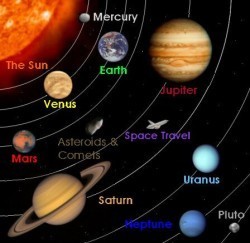Does Earth Start with a Capital “E” ? Confusing Words Part 4
 This post is the fourth in our series of confusing words. I hope you are enjoying the series and that it is clearing up some word problems for you!
This post is the fourth in our series of confusing words. I hope you are enjoying the series and that it is clearing up some word problems for you!
Here are this week’s ten problematic words/word pairs:
1. Earth/earth: Does earth begin with a capital E? Usually it does not. The only time you begin earth with a capital E is when you are using it in the same sentence or context with other heavenly bodies that are capitalized. The names of the other planets are capitalized, but the sun and the moon are not. Examples:
Recycling is just one of the ways in which we can take care of the earth.
Both Jupiter and Saturn are larger than Earth.
2. Emigrate/Immigrate: Emigrate has the prefix -e, which means out. So to emigrate means to leave a country. To immigrate is to go to a country.
They emigrated from Russia to the United States.
They left Russia and immigrated to the United States.
3. Eminent/Imminent: These two words are completely unrelated. Eminent means well-known or renowned in one’s field. Imminent means about to happen.
Dr. Ray is an eminent scientist in the field of cosmology.
Looking at the dark sky, I would say a storm is imminent .
4. Everyone/Every one: Sometimes everyone is one word; other times it is two. It depends on how you are using it. When it should be two words, you will probably find yourself pausing slightly.
Everyone on the list is coming to the party. (meaning everybody)
Every one of the cakes arrived safely at the party. (meaning every single one of them)
5. Fewer/Less: This pair of words is really not that confusing. Use fewer with plurals, and use less with singulars or things that cannot be counted.
There are fewer cookies on this plate than on the other one.
There is less cake on this plate.
6. Firstly, Secondly, Thirdly, Lastly: As transition words, use first, second, third, and last instead of adding the -ly at the end. And please don’t use first off!
First, add sugar. Second, add butter. Third, cream them together. Last, add the flour.
7. Formally/Formerly: Formally involves tuxedos and gowns and is from the word formal. Formerly is what happened before, from the word former.
You need to dress formally for the wedding.
Jane Smith was formerly known as Jane Mills before she got married.
8. Former/Latter: If you have mentioned two things, the former is the first one you mentioned, and the latter is the second.
I have two dogs, a chihuahua and a Great Dane. The former is named Tiny, and the latter is named Big Boy.
9. Farther/Further: Farther has to do with distance. Further means any more.
I live farther away from the college than you do.
I cannot talk about this any further today.
10. Good/well: Good is an adjective; well is an adverb. Adjectives are used to describe nouns, usually. Adverbs are used to describe action verbs, usually. Adjectives, however, are used after linking verbs (for example, the verb to be, look, taste, feel, etc.). Note that even though it is an adverb, well can be used after the to be verb to indicate a state of health. (See example below.)
He plays tennis well .
I did well on the test.
I feel good today.
That cake looks good.
I feel well.
Next week: more confusing words
Buy Arlene Miller’s Books
Join the Goodreads Giveaway of my novel………….
Goodreads Book Giveaway

Trashy Novel
by JoJo Baker
Giveaway ends May 25, 2014.
See the giveaway details
at Goodreads.



